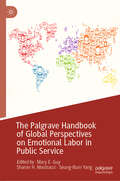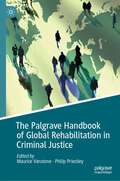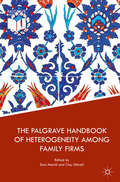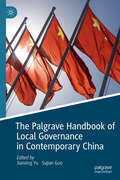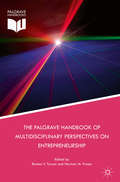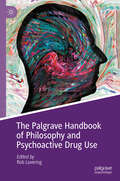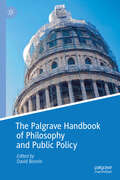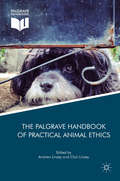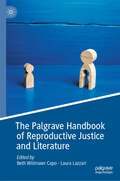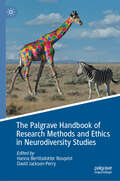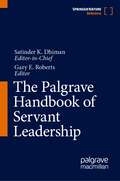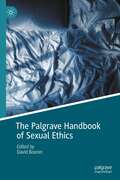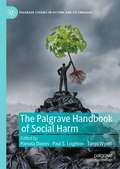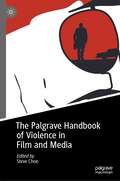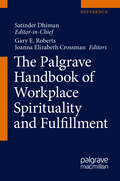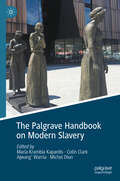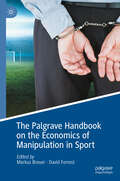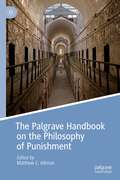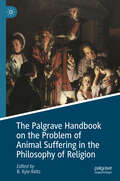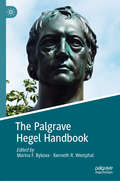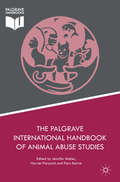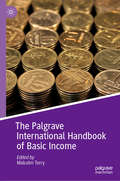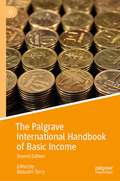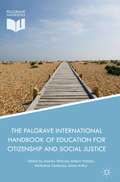- Table View
- List View
The Palgrave Handbook of Global Perspectives on Emotional Labor in Public Service
by Mary E. Guy Sharon H. Mastracci Seung-Bum YangThe Palgrave Handbook of Global Perspectives on Emotional Labor in Public Service challenges traditional public administration theory and its disavowal of the emotive component to public service delivery. Providing a comprehensive and comparative overview of the current research in this previously understudied area, this handbook situates emotional labor within public service and establishes emotional labor within individual, organizational, cultural, and situational scenarios. With chapters spanning twelve different countries across six continents, this handbook provides groundbreaking survey research that probes the daily work experience of public servants, paying special attention to the relational aspect of public service delivery. It ultimately seeks to revise the current public service paradigm, and will be an invaluable resource to researchers, public managers, and international public service organizations as the first of its kind for the public administration market.
The Palgrave Handbook of Global Rehabilitation in Criminal Justice
by Maurice Vanstone Philip PriestleyThis handbook provides a unique overview of rehabilitation as practiced internationally in criminal justice. Through the contributions of a diverse group that includes, among others, academics (some of whom are former practitioners), research students, a judge, and a probation chief, it reflects common features of criminal justice in different countries and documents their diversity and celebrates their vitality. In recent times the idea of ‘law and order’ has been expropriated by populist, authoritarian and doctrinaire regimes, almost always and nearly everywhere in the service of arbitrary and unjust rule. By and large this handbook does not include such regimes. But ‘law’ itself also has the capacity to constrain rulers, and ‘order’ in the form of social peace is a universally approved civic asset. In part, the book provides a counter-narrative demonstrating that although criminal justice dispositions such as probation, prisons, and parole can be represented as a ‘via dolorosa’, rehabilitation as illustrated in these pages can become a journey that leads by degrees towards the possibility of a better life. The handbook will be of interest to students, academics, practitioners, managers, policy makers and all those who wish to gain insight into the why and the how of rehabilitation in criminal justice systems across the world.
The Palgrave Handbook of Heterogeneity among Family Firms
by Esra Memili Clay DibrellThis handbook is the definitive source of research on the differences among family firms. It provides a timely and thorough investigation of the variant strategies and behaviors undertaken by family firms today, taking a closer look at different configurations of family involvement and how they influence outcomes and success. While studies on differences between family and non-family firms are deeply rooted in the literature, this handbook uniquely examines the family firm heterogeneity research to date and the inner firm governance, financial and non-financial objectives, and strategies such as innovation, competitive dynamics, internationalization, and human resources management. The handbook pulls together the work of the most prominent names in family business from around the world, separating itself from the competition both in content and geographical scope. Future research directions provided in each chapter will spark further interdisciplinary scholarly work, and will be enlightening for researchers, educators, and practitioners who are currently limited to the narrow and exclusive literature and advance the burgeoning research on this important topic.
The Palgrave Handbook of Local Governance in Contemporary China
by Sujian Guo Jianxing YuThis Handbook provides a comprehensive overview of local governance in China, and offers original analysis of key factors underpinning trends in this field drawing on the expertise of scholars both inside and outside China. It explores and analyzes the dynamic interaction and collaboration among multiple governmental and non-governmental actors and social sectors with an interest in the conduct of public affairs to address horizontal challenges faced by the local government, society, economy, and civil community and considers key issues such as governance in urban and rural areas, the impact of technology on governance and related issues of education, healthcare, environment and energy.As the result of a global and interdisciplinary collaboration of leading experts, this Handbook offers a cutting-edge insight into the characteristics, challenges and trends of local governance and emphasizes the promotion of good governance and democratic development in China.
The Palgrave Handbook of Multidisciplinary Perspectives on Entrepreneurship
by Romeo V. Turcan Norman M. FraserDeparting from the traditional approach of surveying current and future trends and developments, this unique Handbook brings phenomena, theories, and concepts from multiple disciplines together to advance entrepreneurship. With original contributions from authors who are experts in their fields, the collection offers state-of-the-art insights into generating new areas for research, new theories and concepts, and new questions for policy debates – all aimed at advancing entrepreneurship. Divided into four sections and covering perspectives such as neuroscience, theology, organisational behavior and education, The Palgrave Handbook of Multidisciplinary Perspectives on Entrepreneurship is a rich source of information for researchers, educators, entrepreneurs, leaders and managers.
The Palgrave Handbook of Natural Gas and Global Energy Transitions
by Damilola S. Olawuyi Eduardo G. PereiraThe Palgrave Handbook of Natural Gas and Global Energy Transitions provides an in-depth and authoritative examination of the transformative implications of the ongoing global energy transitions for natural gas markets across the world.With case studies from Africa, Asia, Europe, North America, Latin America, South America, Australia, and the Middle East, the volume introduces readers to the latest legal, policy, technological, and fiscal innovations in natural gas markets in response to ongoing global energy transitions. It outlines the risk mitigation strategies and contractual techniques — focusing on resilience planning, low-carbon business models, green procurement, climate-smart infrastructure development, accountability, gender justice, and other sustainability safeguards — that are required to maximize the full value of natural gas as a catalyst for a just and equitable energy transition and for energy security across the world.Written in an accessible style, this book outlines the guiding principles for a responsible and low-carbon approach to the design, financing, and implementation of natural gas development and commercialization. It is an indispensable text and reference work for students, scholars, practitioners, and stakeholders in natural gas, energy, infrastructure, and environmental investments and projects.
The Palgrave Handbook of Philosophy and Psychoactive Drug Use
by Rob LoveringIn this Handbook, philosophers from around the world address the metaphysics, epistemology, and value of psychoactive (mind-altering) drug use. In so doing, they attempt to answer questions such as: What does the fact of drug-induced mind-altering experiences tell us about natures of the mind, free will, and God? What does it tell us about what, and how, we can know? Are drug-induced mind-altering experiences valuable, morally, aesthetically, or otherwise? Is the acquisition of drug-induced mind-altering experiences ever immoral? Should the acquisition of drug-induced mind-altering experiences ever be legally prohibited? The Handbook gives an overview of the current research, and sets the stage for future directions in philosophical thought relating to psychoactive drug use.
The Palgrave Handbook of Philosophy and Public Policy
by David BooninThis book brings together a large and diverse collection of philosophical papers addressing a wide variety of public policy issues. Topics covered range from long-standing subjects of debate such as abortion, punishment, and freedom of expression, to more recent controversies such as those over gene editing, military drones, and statues honoring Confederate soldiers. Part I focuses on the criminal justice system, including issues that arise before, during, and after criminal trials. Part II covers matters of national defense and sovereignty, including chapters on military ethics, terrorism, and immigration. Part III, which explores political participation, manipulation, and standing, includes discussions of issues involving voting rights, the use of nudges, and claims of equal status. Part IV covers a variety of issues involving freedom of speech and expression. Part V deals with questions of justice and inequality. Part VI considers topics involving bioethics and biotechnology. Part VII is devoted to beginning of life issues, such as cloning and surrogacy, and end of life issues, such as assisted suicide and organ procurement. Part VIII navigates emerging environmental issues, including treatments of the urban environment and extraterrestrial environments.
The Palgrave Handbook of Practical Animal Ethics (The Palgrave Macmillan Animal Ethics Series)
by Andrew Linzey Clair LinzeyThis handbook provides an in-depth examination of the practical and theoretical issues within the emerging field of animal ethics. Leading experts from around the globe offer insights into cutting edge topics as diverse as killing for food, religious slaughter, animal companions, aquariums, genetic manipulation, hunting for sport and bullfighting. Including contributions from Lisa Johnson on the themes of human dominance, Thomas White on the ethics of captivity, Mark Bernstein on the ethics of killing and Kay Peggs on the causation of suffering, this handbook offers an authoritative reference work for contemporary applied animal ethics. Progressive in approach, the authors explore the challenges that animal ethics poses both conceptually and practically to traditional understandings of human–animal relations. Key Features: · Structured in four parts to examine the ethics of control, the ethics of captivity, the ethics of killing and the ethics of causing suffering · Interdisciplinary approach including philosophical, historical, scientific, legal, anthropological, religious, psychological and sociological perspectives · Focussed treatment of practical issues such as animals in farming, zoos and animal experimentation The Palgrave Handbook of Practical Animal Ethics is an essential resource for those with an interest in the ethics of modern-day treatment of animals as well as scholars, researchers and advanced students in zoology, philosophy, anthropology, religious studies and sociology.
The Palgrave Handbook of Reproductive Justice and Literature
by Laura Lazzari Beth Widmaier CapoThis handbook offers a collection of scholarly essays that analyze questions of reproductive justice throughout its cultural representation in global literature and film. It offers analysis of specific texts carefully situated in their evolving historical, economic, and cultural contexts. Reproductive justice is taken beyond the American setting in which the theory and movement began; chapters apply concepts to international realities and literatures from different countries and cultures by covering diverse genres of cultural production, including film, television, YouTube documentaries, drama, short story, novel, memoir, and self-help literature. Each chapter analyzes texts from within the framework of reproductive justice in an interdisciplinary way, including English, Japanese, Italian, Spanish, and German language, literature and culture, comparative literature, film, South Asian fiction, Canadian theatre, writing, gender studies, Deaf studies, disability studies, global health and medical humanities, and sociology. Academics, graduate students and advanced undergraduate students in Literature, Gender, Sexuality and Women’s Studies, Cultural Studies, Motherhood Studies, Comparative Literature, History, Sociology, the Medical Humanities, Reproductive Justice, and Human Rights are the main audience of the volume.
The Palgrave Handbook of Research Methods and Ethics in Neurodiversity Studies
by Hanna Bertilsdotter Rosqvist David Jackson-PerryThis timely volume brings together well-established scholars and emerging voices to explore research methods and ethics in Neurodiversity Studies. It explores the epistemic injustice that currently surrounds much knowledge production around neurodivergence, and offers concrete examples of creative, participatory, and collaborative research practice in the field. The editors have assembled chapters combining reflexive, theoretical, and practical contributions. Together they address current debates surrounding participatory methods and Neurodiversity Studies and are unique in giving voice to mainly neurodivergent researchers and contributors across autism, ADHD, acquired brain injury, and multiple neurodivergence. The first of its kind, this much-needed volume contains essential reading for all those learning and teaching in the field of neurodiversity. It further represents a valuable resource for students and academics at all levels, participatory or creative researchers, research commissioners, and research evidence users across the social sciences.
The Palgrave Handbook of Servant Leadership
by Satinder K. DhimanThis reference work offers comprehensive perspectives on servant leadership. Featuring a cadre of leading world-class scholars, practitioners, and contributing authors from diverse fields of inquiry, it aims to collate research on servant leadership with a particular focus on its moral and spiritual dimensions.It is divided into sections that center on topics such as character, philosophical influences, diversity and inclusion, critiques of servant leadership as well as examples of servant leadersThough first introduced in the 1970 by Robert Greenleaf, the field of servant leadership is still lacking consensus on a definition and a theoretical framework. The goal of this reference work is to begin to fill this gap by assembling the scholarship of the top scholars in this field and providing a go-to source for information on the theory and practice of servant leadership. This handbook will serve as an essential resource for researchers, scholars, and students of organizational behavior, human resource management, and business ethics, as well as consultants and business leaders interested in discovering the best leadership models to suit contemporary organizations.
The Palgrave Handbook of Sexual Ethics
by David BooninThe Palgrave Handbook of Sexual Ethics is a comprehensive collection of recent research on the ethics of sexual behavior, representing a wide range of perspectives. It addresses a number of traditional subjects in the area, including questions about pre-marital, extra-marital, non-heterosexual, and non-procreative sex, and about the nature and significance of sexual consent, sexual desire, and sexual activity, as well as a variety of more recent topics, including sexual racism, sexual ableism, sex robots, and the #metoo response to sexual harassment. Each chapter defends a substantive thesis about the topic it addresses and the handbook as a whole thereby provides a strong foundation for future research in this important and growing field of inquiry.
The Palgrave Handbook of Social Harm (Palgrave Studies in Victims and Victimology)
by Pamela Davies Paul Leighton Tanya WyattThis handbook explores the concept of 'harm' in criminological scholarship and lays the foundation for a future zemiological agenda. 'Social harm' as a theoretical construct has become established as an alternative, broader lens through which to understand the causation and alleviation of widespread harm in society, thus moving beyond criminology and state definitions of crime and extending the range of criminological research. Applying zemiological concepts, this book comprehensively explores topics including violence, moral indifference, workplace injury, corporate and state harms, animal rights, migration, gender, poverty, security and victimisation. This definitive work covers theory, research, scholarship and future visions across four sections, and includes contributions from areas such as criminology, sociology, socio-legal and cultural studies, social policy and international relations. It offers readers up-to-date, original theoretical perspectives and an analysis of a broad range of issues from a 'social harm' perspective.
The Palgrave Handbook of Violence in Film and Media
by Steve ChoeThe chapters contained in this handbook address key issues concerning the aesthetics, ethics, and politics of violence in film and media. In addition to providing analyses of representations of violence, they also critically discuss the phenomenology of the spectator, images of atrocity in international cinema, affect and documentary, violent video games, digital infrastructures, cruelty in art cinema, and media and state violence, among many other relevant topics. The Palgrave Handbook of Violence in Film and Media updates existing studies dealing with media and violence while vastly expanding the scope of the field. Representations of violence in film and media are ubiquitous but remain relatively understudied. Too often they are relegated to questions of morality, taste, or aesthetics while judgments about violence can themselves be subjected to moral judgment. Some may question whether objectionable images are worthy of serious scholarly attention at all. While investigating key examples, the chapters in this handbook consider both popular and academic discourses to understand how representations of violence are interpreted and discussed. They propose new approaches and raise novel questions for how we might critically think about this urgent issue within contemporary culture.
The Palgrave Handbook of Workplace Spirituality and Fulfillment
by Satinder Dhiman Gary E. Roberts Joanna Elizabeth CrossmanThis book presents an up-to-date and comprehensive survey of the field of Workplace Spirituality. It uses a structured yet open-ended schema to capture the best of research and practices on the subject. Presenting a clear and concise approach to spirituality in the workplace, it traces the genesis and growth of this burgeoning field and suggests trends and future directions in Workplace Spirituality. Drawing upon various theistic and non-theistic traditions of the world, it negotiates a clear dialectic of different dimensions and models of Workplace Spirituality, including the best of emerging new age spiritualties. Weaving various strands of management, spirituality, religion, and positive psychology in a systematic manner, this Handbook provides an in-depth and critical appraisal of a wide array of topics such as: spiritual, social, and emotional intelligence; mindfulness, meaning and purpose and fulfillment at work; various forms of positive leadership such as servant, values-based, authentic, spiritual leadership; servant-followership and corporate citizenship behavior; workplace spirituality and organizational performance.
The Palgrave Handbook on Modern Slavery
by Colin Clark Michel Dion Ajwang’ Warria Maria Krambia KapardisThis handbook takes a comprehensive approach to studying and understanding modern slavery, particularly forced labour and human trafficking. It considers the historical and cultural roots of modern slavery and suggests that analyzing the issue from humanities, social sciences, criminological, and business perspectives could lead to a better understanding of its emergence worldwide. The handbook also highlights the role of religions/spiritualities and multinational corporations in the expansion of modern slavery and argues that exploring their potential ethical responsibilities is essential. Furthermore, it combines theoretical frameworks of intersectionality and globalization to study the interconnectedness of various factors in shaping and understanding modern slavery. Finally, it contains an impressive range of geographic and conceptual approaches to the problems of combating modern slavery.
The Palgrave Handbook on the Economics of Manipulation in Sport
by David Forrest Markus BreuerThis updated and expanded new edition explores how sport is manipulated for economic and political gain. Manipulation in sport takes many forms and carefully selected chapters detail the broad variety of ways this can take place. The different types of manipulation in sport are outlined, including doping, match-fixing, and breaking Financial Fair Play, to provide a foundation to the topic. The role of legal interventions, in particular the Court of Arbitration for Sport, is discussed, alongside the governance of sports organisations and the corruption of sporting organisations, to highlight how sport can be exploited by tainted political regimes. New chapters looking at whistleblowing, sportwashing, e-sports, and horseracing broaden the scope of the book and explore recent debates. This book aims to examine manipulation in sport through the lens of economics, bringing light to the various ways benefits can be gained from rule and regulation breaches. It will be relevant to students and researchers interested in sports economics and sport governance.
The Palgrave Handbook on the Philosophy of Punishment (Palgrave Handbooks in the Philosophy of Law)
by Matthew C. AltmanThis Handbook provides a comprehensive survey of major topics in the philosophy of punishment from many of the field’s leading scholars. Key featuresPresents a history of punishment theory from ancient times to the present.Evaluates the main proposed justifications of punishment, including retributivism, general and specific deterrence theories, mixed theories, expressivism, societal-defense theory, fair play theory, rights forfeiture theory, and the public health-quarantine model.Discusses sentencing, proportionality, policing, prosecution, and the role punishment plays in the context of the state.Examines advances in neuroscience and debates about whether free will skepticism undermines the justifiability of punishment.Considers forgiveness, restorative justice, and calls to abolish punishment.Addresses pressing social issues such as mass incarceration, juvenile justice, punitive torture, the death penalty, and “cruel and unusual” punishment. · With its unmatched breadth and depth, this book is essential reading for scholars who want to keep abreast of the field and for advanced students wishing to explore the frontiers of the subject.
The Palgrave Handbook on the Problem of Animal Suffering in the Philosophy of Religion (The Palgrave Macmillan Animal Ethics Series)
by B. Kyle KeltzAtheists argue that animal pain, disease, suffering, and death cause a problem for theism because they believe that an all-knowing, all-powerful, and all-good God would not use millions of years of animal suffering just to make a world suitable for humans. Animal suffering was not a concern for theism through the medieval period, but it has been increasingly discussed in philosophy of religion since modern times, and there is especially a large and growing amount of literature on this subject that has been published in the last few decades. This handbook serves as a guide for those interested in the literature on the problem by bringing together experts in the philosophy of religion, theology, environmental ethics, and the philosophy of animal minds. It not only presents major formulations of the problem of animal suffering and major theodicies, but it also discusses metaethical issues regarding animal suffering, the question of animal consciousness and self-awareness and their implications for animal suffering, and what implications available theodicies might have for animal ethics.
The Palgrave Hegel Handbook (Palgrave Handbooks in German Idealism)
by Kenneth R. Westphal Marina F. BykovaThis handbook presents the conceptions and principles central to every aspect of Hegel’s systematic philosophy. In twenty-eight thematically linked chapters by leading international experts, The Palgrave Hegel Handbook provides reliable, scholarly overviews of each subject, illuminates the main issues and debates, and details concisely the considered views of each contributor. Recent scholarship challenges traditional, largely anti-Kantian, readings of Hegel, focusing instead on Hegel’s appropriation of Kantian epistemology to reconcile idealism with the rejection of foundationalism, coherentism and skepticism. Focused like Kant on showing how fundamental unities underlie the profusion of apparently independent events, Hegel argued that reality is rationally structured, so that its systematic structure is manifest to our properly informed thought. Accordingly, this handbook re-assesses Hegel’s philosophical aims, methods and achievements, and re-evaluates many aspects of Hegel’s enduring philosophical contributions, ranging from metaphysics, epistemology, and dialectic, to moral and political philosophy and philosophy of history. Each chapter, and The Palgrave Hegel Handbook as a whole, provides an informed, authoritative understanding of each aspect of Hegel’s philosophy.
The Palgrave International Handbook of Animal Abuse Studies
by Piers Beirne Jennifer Maher Harriet PierpointThis Handbook fills a large gap in current scholarly literature on animal abuse studies. It moves considerably beyond the debate that has traditionally dominated the discourse of animal abuse - the link between one-on-one interpersonal violence and animal abuse - and towards those institutionalised forms of animal abuse which are routine, everyday, socially acceptable and invisibilised. Chapters from expert contributors raise issues such as: the use of animals as edibles; vivisection; animal sexual assau< animals used in sport and hunting; animal trafficking; the use of animals by youth gangs, by other groups and in war; species extinction; and the passivity of national and international organisations in combating animal abuse. The Handbook is a unique text: it is essential reading for students, researchers, academics, activists and policy makers involved in understanding and preventing animal abuse.
The Palgrave International Handbook of Basic Income (Exploring the Basic Income Guarantee)
by Malcolm Torry“This Handbook offers a timely ‘snapshot’ of the fast-moving global debates on Basic Income. Embracing a range of ideological, ethical, historical and cross-national perspectives, it looks at the case for Basic Income through both a focused and a wide-angled lens. Rather than asserting hard and fast conclusions, it ends with the valuable message that context is all.”—Ruth Lister, Loughborough University, UK “A must-read Handbook that provides solid foundations for the growing number of researchers, policymakers and campaigners involved in the ongoing debate on Basic Income."—Rubén M. Lo Vuolo, the Interdisciplinary Centre for the Study of Public Policy, Argentina “A comprehensive, competent, accessible, up-to-date picture of the current state of knowledge and debate on basic income in several disciplines and in many countries.”—Philippe Van Parijs, the University of Louvain, Belgium A Basic Income is an unconditional regular payment for every individual. But is it desirable? And is it feasible? This Handbook brings together scholars from various disciplines and from around the world to examine the history, characteristics, effects, viability and implementation of Basic Income. A variety of pilot projects and ideological perspectives are considered in depth.
The Palgrave International Handbook of Basic Income (Exploring the Basic Income Guarantee)
by Malcolm TorryThis handbook brings together scholars from various disciplines and from around the world to examine the history, characteristics, effects, viability and implementation of basic income. The first edition of this book contributed a comprehensive treatment of multiple aspects of the basic income debate. This updated, expanded edition tackles new topics that are becoming increasingly prominent in the global debate. New chapters are devoted to recent research on the history of basic income; the development and peacemaking potential of basic income in conflict zones; municipal experiments in the United States; requirements for pilot projects and experiments; and the public health implications of basic income. Existing chapters on the implementation of basic income have also been substantially updated to take account of new research on microsimulation, land value tax, local currencies, and blockchain technology and cryptocurrency, along with new material on the increasing use of opinion polls and the difficulties related to that. New political and ethical perspectives on the role of trade unions and their increasing engagement with the basic income debate are also introduced, while the section on pilot projects and experiments has been updated to cover recent political developments. Fully updated to reflect new global developments in the basic income debate, this handbook will be of interest to researchers, teachers and research-oriented policymakers in a range of fields.
The Palgrave International Handbook of Education for Citizenship and Social Justice
by Andrew Peterson Michalinos Zembylas James Arthur Robert HattamThis state-of-the-art, comprehensive Handbook is the first of its kind to fully explore the interconnections between social justice and education for citizenship on an international scale. Various educational policies and practices are predicated on notions of social justice, yet each of these are explicitly or implicitly shaped by, and in turn themselves shape, particular notions of citizenship/education for citizenship. Showcasing current research and theories from a diverse range of perspectives and including chapters from internationally renowned scholars, this Handbook seeks to examine the philosophical, psychological, social, political, and cultural backgrounds, factors and contexts that are constitutive of contemporary research on education for citizenship and social justice and aims to analyse the transformative role of education regarding social justice issues. Split into two sections, the first contains chapters that explore central issues relating to social justice and their interconnections to education for citizenship whilst the second contains chapters that explore issues of education for citizenship and social justice within the contexts of particular nations from around the world. Global in its perspective and definitive in content, this one-stop volume will be an indispensable reference resource for a wide range of academics, students and researchers in the fields of Education, Sociology, Social Policy, Citizenship Studies and Political Science.
